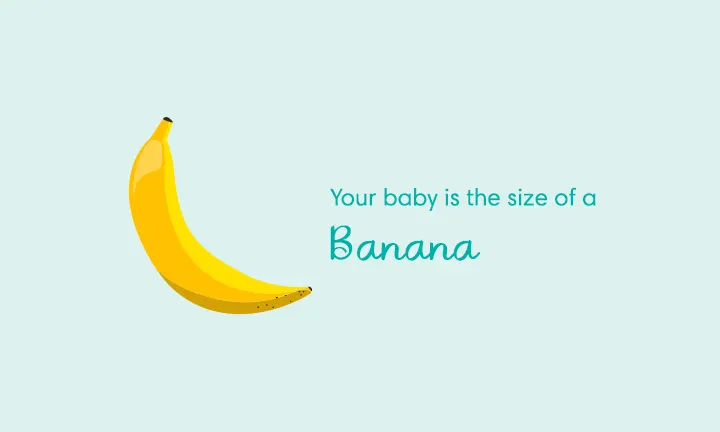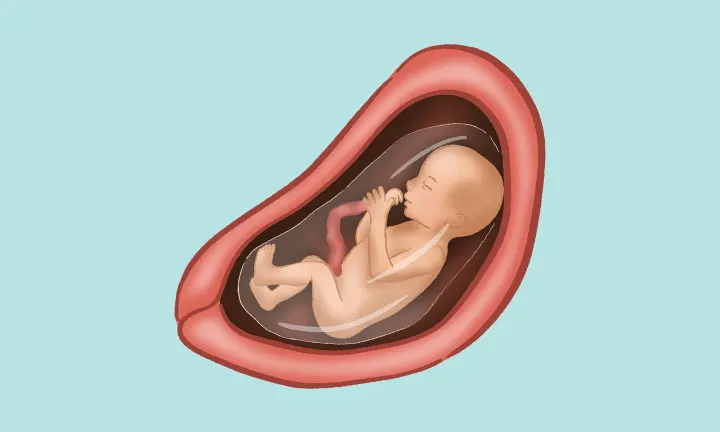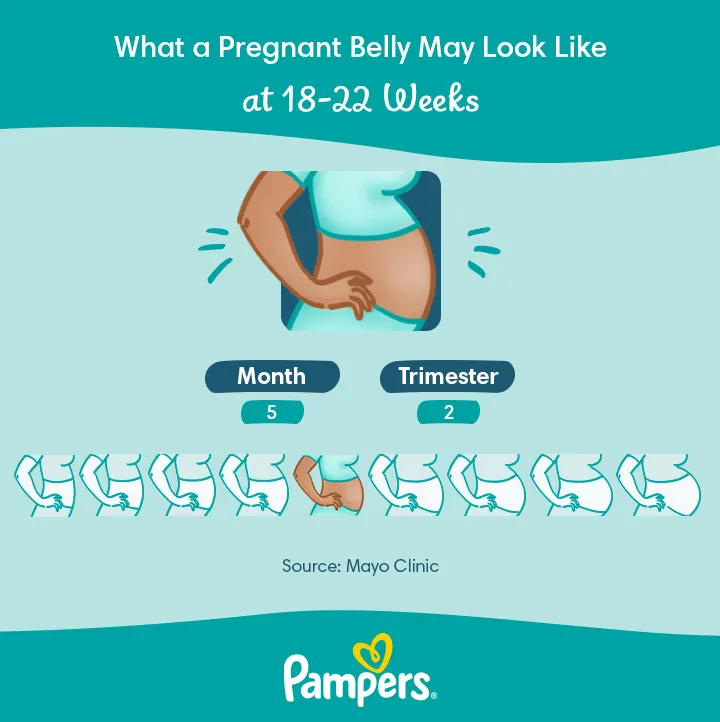21 Weeks Pregnant
You're officially in the midst of your second trimester and have reached the 21-week mark of your pregnancy. By now, you've probably experienced a range of changes in your body and emotions. From feeling your baby's first wriggles to potentially finding out the gender, there's a lot to look forward to at this stage. We’ll cover everything you need to know about being 21 weeks pregnant, from your baby's development to symptoms you may experience, and what to expect in the coming weeks.
Highlights at 21 Weeks Pregnant
Below we’ve highlighted some of the ways your baby is growing and changing, and how you might be feeling at 21 weeks pregnant:
Your little one's sleep and wake cycle is becoming more regular.
Those little movements inside your belly may be getting stronger now.
You may have some uncomfortable symptoms at 21 weeks pregnant, but with any luck, you’re also experiencing a surge of energy in your second trimester.
Searching for the perfect name for your baby? Jump-start your search with the help of our Baby Name Generator below.
Pregnancy Weight Gain Calculator
Fill out your details:
21 Weeks Pregnant: Your Baby’s Development
Here are some of the exciting developmental steps your baby is making this week:
Your baby is already starting to sleep and wake in subtle cycles. Around 21 weeks pregnant, ultrasounds show that unborn babies may even settle into a favourite sleeping position in the womb.
At around 21 weeks pregnant, if you were to have an ultrasound, you might glimpse your baby sucking on a thumb.
By now, your baby’s digestive system is developing, and they’re now able to swallow small amounts of amniotic fluid, which can be absorbed by the intestines.
Your baby's liver and spleen have been making blood cells, and now the bone marrow is also contributing to blood cell formation and will soon take over the job. Both the liver and spleen will stop producing these blood cells before birth.
How Many Months Is 21 Weeks Pregnant?
Now that you're at 21 weeks pregnant, how does that translate into months? Although pregnancy can be measured in various ways, at 21 weeks, you’re most often considered five months pregnant.
It’s also common to wonder how many weeks are left when you’re at 21 weeks pregnant. Although it’s difficult to know the exact day your baby will arrive, full term is usually around 40 weeks. You can get an estimate by using our Due Date Calculator.
How Big Is a Baby at 21 Weeks Pregnant?
When you’re 21 weeks pregnant, your baby’s size is roughly the same as a banana. Your little banana is growing quickly and they’re likely over 15 centimetres long and weigh about 300 grams!
Your Baby: What Does 21 Weeks Pregnant Look Like?
This illustration can help you envisage what your little one may look like inside your pregnancy bump at 21 weeks:
Your Body at 21 Weeks Pregnant
You may have had some heartburn and indigestion earlier in the first trimester, but around 21 weeks pregnant, as your baby grows your uterus gets larger and may start pushing up against your stomach. This can cause you to have heartburn more frequently.
Around this time, your pregnancy hormones may also cause hot flashes, and the extra weight gain can cause some aches and pains now and in the coming weeks.
21 Weeks Pregnant: Your Symptoms
At 21 weeks pregnant, you may be experiencing some of the following symptoms:
Sore spots. Backaches, especially in the lower back, are quite common during pregnancy. When you are 21 weeks pregnant, your growing belly is shifting your centre of gravity and pulling your lower back forward, which can lead to aches and pains. Meanwhile, the hormone relaxin is loosening the joints and ligaments in the pelvic area, which will allow your pelvis to expand when it's time for delivery.
Heartburn. Another common symptom around 21 weeks pregnant is heartburn. In addition to the uterus pushing against your stomach, pregnancy hormones relax the valve between your esophagus and stomach, causing some stomach acid to leak into the esophagus.
Hot flashes. Pregnancy hormones and your increased metabolic rate can leave you feeling hot and sweaty. Make sure you stay cool by wearing loose clothing and drinking plenty of water. Switch on a fan or crank up the air conditioning and try to stay as comfortable as possible.
Stretch marks. As your belly continues growing at 21 weeks pregnant and throughout your pregnancy, you may notice some reddish-brown, pink, or purple lines on your skin. Stretch marks form when your skin stretches over a short period of time and can appear along your belly, hips, thighs, buttocks, and breasts. Your skin may start to feel itchy, too; applying moisturizer should help.
Leg cramps. At 21 weeks pregnant, if you feel any cramping in your legs, don’t worry; this is a common complaint from pregnant people in the second trimester. You may notice that cramps tend to strike more at night. Try to stretch your calf muscles before bed, drink plenty of water, or have a warm bath or shower to help ease the discomfort or prevent cramping altogether.
Braxton Hicks. At 21 weeks pregnant, it’s important to know about Braxton Hicks contractions. These normal "false" or practice contractions can occur in the second or third trimester and are a way to ready your body for labour. If you notice a slight tightening in the front of your abdomen, this may be a Braxton Hicks contraction. Lower abdominal pains around 21 weeks usually signify something else, such as round ligament pain caused by your growing uterus. Contact your healthcare provider if you experience severe pain or have any concerns.
How Big Is a Pregnant Belly at 21 Weeks?
Every pregnancy is unique, but at 21 weeks pregnant your belly bump might be quite noticeable, as your baby and uterus continue to grow. Your uterus might reach your navel by now and may also be pushing up against your stomach.
As you move past quickening—your baby’s first movements—it will be exciting to feel those fetal movements getting stronger at 21 weeks pregnant and in the coming weeks—prepare to feel some little jabs and kicks.
What Does 21 Weeks Pregnant Look Like?
For a better idea of what your belly might look like around 21 weeks pregnant, check out the image below.
21 Weeks Pregnant: Things to Consider
Your pregnancy journey will bring many lifestyle changes along the way. Check out some helpful things to consider at 21 weeks pregnant:
To help alleviate back pain, make these adjustments in your daily routine. Whenever you sit, use a footrest to elevate your feet slightly. If you need to stand for a long period of time, put one foot on a small stool to take some pressure off your lower back. Treat yourself to a warm bath for additional relief. If your backache won't go away, give your healthcare provider a call.
The B vitamins, including B1, B2, and B6, are key nutrients because they supply energy for your baby’s development. They also help promote good vision and help build the placenta, along with other body tissues. If you’re taking a prenatal supplement, you should be getting enough B vitamins already, but you can also get them from dietary sources like liver, pork, poultry, bananas, and beans.
Choline is another nutrient you may need more of when you’re pregnant. Even though your body can produce choline naturally, when you’re pregnant, you’re not making enough for the two of you. This is easy to top up with a balanced diet, so try to add more chicken, beef, eggs, milk, and peanuts, all of which will help boost your choline levels.
As your uterus gets bigger, you may notice your centre of gravity shifts, and you may feel a little off balance. Take care of yourself and reduce the risk of falling by wearing flat shoes, being careful on stairs, and avoiding slippery surfaces. If you do fall at 21 weeks or anytime during your pregnancy, and you’re concerned, experience bleeding, or you start experiencing contractions, contact your healthcare provider.
The next couple of months are a good time to get some preparations out of the way, especially as your energy levels might dip come the third trimester. Things like getting your baby’s nursery ready, making a list of all the baby gear you’ll need, and creating a baby budget are all tasks you can start now, if you haven’t already.
Even as your pregnancy progresses, staying active is important for your body and can help with how you’re feeling as well. Speak to your healthcare provider if you’re unsure about what exercise is safe for you to do at this stage. Typically, things like walking, prenatal yoga, and swimming can still be good options.
If you’re 21 weeks pregnant with twins, read about twin pregnancy for some helpful tips and discover the differences between a single and multiple pregnancy.
Tip for Partners |
21 Weeks Pregnant: Consult Your Healthcare Provider
With pregnancy comes many questions and concerns. Remember that your healthcare provider is always there to guide you along the way. Here are some common questions at 21 weeks pregnant:
What are the signs of gestational diabetes and am I at risk?
Can a maternity belt help with back pain?
Do I need to increase my intake of nutrients like choline and B vitamins as part of my diet?
What is a doula, and should I consider hiring one for labour and delivery?
FAQS AT A GLANCE
Despite the different ways of dividing the 40 weeks of pregnancy into months, likely you're still in your fifth month of pregnancy by the time you reach 21 weeks.
In this article, you can discover more information on the size of your baby, belly, and some helpful pregnancy tips for you when you’re 21 weeks pregnant.
21 Weeks Pregnant: Your Checklist
As you hit the halfway point in your pregnancy, consider some of the following to-dos:
□ Get a footrest to elevate your feet slightly whenever you sit.
□ Treat yourself to warm baths to help relieve back pain.
□ If you haven’t done so already, sign up for a childbirth class.
□ Make sure your baby registry is done, especially if your baby shower is happening soon.
□ It may be time for your partner to start looking into paternity leave if they haven't done this already.
21 weeks pregnant - checklist
How We Wrote This Article The information in this article is based on the expert advice found in trusted medical and government sources, such as the American Academy of Pediatrics and the American College of Obstetricians and Gynecologists. You can find a full list of sources used for this article below. The content on this page should not replace professional medical advice. Always consult medical professionals for full diagnosis and treatment.


